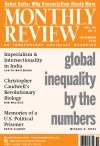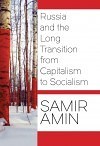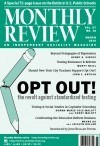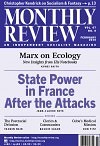Europe

David Vine, Base Nation: How U.S. Military Bases Abroad Harm America and the World (New York: Metropolitan, 2015), 418 pages, $35.00, hardcover.
The United States maintains about 800 military installations around the world, and the number is growing, despite partial withdrawals of troops from Iraq and Afghanistan and scaling back of major European bases. The continued expansion…has come mainly through a series of smaller “lily pad” installations, originally proposed by Defense Secretary Donald Rumsfeld, that are now being built in Africa, Eastern and Central Europe, Latin America, the Middle East, and beyond.… [David] Vine, a professor of anthropology at American University [and author of Base Nation], visited more than sixty current or former bases in twelve countries and territories. Although scholars such as Chalmers Johnson, Cynthia Enloe, and Catherine Lutz, as well as contributors to Monthly Review, have for decades sounded the alarm about the ever-expanding global network of U.S. military bases, Vine’s new study provides a comprehensive update, persuasively documenting the ways that “far from making the world a safer place, U.S. bases overseas can actually make war more likely and America less secure.” | more…

U.S. presidential elections, if nothing else, throw considerable light on the ideology and imperatives of the system. This is particularly the case with respect to imperialism, where one sees signs of a declining and increasingly desperate U.S. empire. Hillary Clinton has been calling for a no-fly zone in Syria (which would include Russian planes!), thereby threatening a confrontation with Russia on a level not seen since the Cuban Missile Crisis.… Trump, for his part, while appearing to suggest a kind of détente with Russia, is ready to intervene directly and massively in Iraq against the Islamic State (ISIS, ISIL, Daesh), including the use of ground troops. He supports the extension of torture and the slaughter of whole families of suspected terrorists. He claims that he would raise Israel from being a second-level power…. In short, the presidential nominees for the two major political parties are each posturing over who is the most aggressive and bellicose upholder of U.S. militarism and imperialism—and in ways that threaten further escalation of war in the Middle East and in opposition to Russia. | more…

It is by now well known that significant and growing economic inequality is a central feature of the U.S. economy, as previous articles in Monthly Review have shown. However, the same is also the case for much of the rest of the world. Inequality arises in other countries for reasons similar to those in the United States, but each nation has its own history, along with widely divergent economic and political structures. Here we will look first at the most recent data on global inequality, and then at its causes and consequences. | more…

The Dialectical Science of Christopher Caudwell
Next year will mark the eightieth anniversary of the Battle of Jarama.… In February 1937, eleven thousand Republicans…fought and died defending Madrid against Francisco Franco’s fascist incursion. At this point in Spain’s Civil War, the country was split evenly between west and east by rebel Nationalist and Republican forces. An earlier direct assault on Madrid had been repulsed. Republican troops subsequently consolidated their defenses along the Manzanares River. An assault through Madrid’s southern barrios would have cost Franco’s forces dearly. General Emilio Mora’s men north of the city in the meantime were held in check by Popular Front forces in the Sierra de Guadarrama.… The Nationalists turned to cutting off Madrid from the Republic’s provisional capital. They planned to march south before swinging north and capturing the road to Valencia. In early February, Franco ordered 40,000 of his battle-hardened Moroccan troops and an Italian unit provided by Mussolini to attack. The forces crossed the Jarama River on February 11. Republican General José Miaja countered the thrust with three battalions of the XV International Brigade, including the Dimitrov Battalion and the British Battalion. | more…

Timothy Sheard, the Lenny Moss mystery series (New York: Hardball).
At its best, the art of fiction reveals the underlying truth of human relations: we are communal and collaborative by nature. Selfishness and greed are social aberrations because, ultimately, they violate the principle of self-preservation. No wonder we are drawn to crime stories: they mirror our common experience. Capitalism is high crime disguised as church doctrine. Conspiracy is evident, though the evidence is concealed. Hence, our fascination with the detective genre. We are in dire need of Timothy Sheard’s scrutiny—a detective who peers through a working-class eyeglass. | more…

On July 14, 2016, Cornel West, a Monthly Review contributor and Monthly Review Press author (his 1991 book The Ethical Dimensions of Marxist Thought remains in print) issued a historic statement in the Guardian, under the headline “Obama Has Failed Victims of Racism and Police Brutality.” West wrote:
A long and deep legacy of white supremacy has always arrested the development of US democracy. We either hit it head on, or it comes back to haunt us…. I have deep empathy for brothers and sisters who are shot in the police force. I also have profound empathy for people of color who are shot by the police. I have always believed deliberate killing to be a crime against humanity. Yet, Obama didn’t go to Baton Rouge. He didn’t go to Minneapolis. He flew over their heads to go to Dallas. You can’t do that. His fundamental concern was to speak to the police, that was his priority. When he references the Black Lives Matter movement, it’s to speak to the police. But the people who are struggling have a different perspective….

Out of early twentieth-century Russia came the world’s first significant effort to build a modern revolutionary society. According to Marxist economist Samir Amin, the great upheaval that once produced the Soviet Union also produced a movement away from capitalism—a long transition that continues today. In seven concise, provocative chapters, Amin deftly examines the trajectory of Russian capitalism, the Bolshevik Revolution, the collapse of the Soviet Union, the possible future of Russia—and, by extension, the future of socialism itself. | more…
Applying a North American Brand to Britain
During the past decade, persistent excess productive capacity, at levels exceeding at times 25 percent, has blighted the British economy, along with rates of unemployment not experienced for two decades, with the result that a substantial proportion of the economy’s productive resources remain underutilized. Orthodox economic theory often ascribes such phenomena to a lack of capital for investment. However, in the same period, interest rates have been historically low, and the UK corporate sector has accumulated increasing reserves of surplus capital. Clearly, there has been no shortage of capital for investment. The failure to invest stems not from the supply of capital, but instead from the paucity of investment opportunities, suggesting that British capitalism is mired in stagnation. | more…
From Public Service to Corporate Power
In the face of austerity cuts to state infrastructure provision, the British Broadcasting Corporation has recently generated something of a moral panic about the future of public sector broadcasting—mobilizing both its own news channel and its friends in the corporate media around the issue. Yet in the midst of this ongoing existential crisis, few have asked: What is it we are being asked to defend?… As in car manufacturing, what is provided is a limitedly resourced primary product, altered for different consumption demands, by add-on and take-off parts. | more…

Ellen Meiksins Wood, who died on January 14, was coeditor of Monthly Review with Harry Magdoff and Paul M. Sweezy from 1997 to 2000, and a major contributor to historical materialist thought in the late twentieth and early twenty-first century. Her parents were socialist refugees, members of the Jewish Labor Bund who came to the United States in 1941, after fleeing Latvia in the 1930s, when indigenous fascists came to power. Her mother worked for the Jewish Labor Committee in New York and her father for the United Nations. Ellen obtained her B.A. in Slavic languages at the University of California at Berkeley and went on to do graduate studies in political science at Berkeley, where she met and married Neal Wood, a professor in the department. From the late 1960s to the late 1990s, she taught political theory in the political science department at York University in Toronto. | more…

From mainstream news reports, one might easily conclude that the Paris climate agreement, presented to the world on December 12, 2015, was a complete triumph. The Guardian headlined it as “The World’s Greatest Diplomatic Success.” However, by any meaningful criteria, the Paris climate change agreement was fraudulent, based on a fabric of illusion. Moreover, the distorted media coverage of the climate deal, presenting it as a historical agreement virtually without shortcomings, was made possible in large part by the French government’s banning of the mass climate protests, following the November 2015 terrorist attacks in Paris. With radical protestors silenced and their demands marginalized, the global power elite could make virtually any public claims it wished, without acknowledging any other public voice or alternative view. | more…
The Paris attacks of November 13, 2015, demonstrate, if such a demonstration is still necessary, that the aim of new French intelligence laws is not to anticipate or prevent terrorist attacks, but simply to eliminate the private lives of French citizens. President Hollande’s statements that delays in implementing the law were behind the “failure” of the intelligence services are a denial of the fact that this legislation only confirms existing practices. The Law on Intelligence, just like the law on military planning, is mainly an attack on private freedoms. The state of emergency will likewise eliminate public freedoms.… Following the November 13 massacres, the government is already considering changes to the Law on Intelligence, with the aim of “eas[ing] the procedures the intelligence services must follow when they would like to use means of surveillance.” Yet this law does not establish any controls over the activities of the secret services. It does set up a National Control Commission, but this body has no effective possibility of carrying out its mission, and can only offer recommendations. It is not a question, then, of eliminating a control that does not exist, but of signaling that the very idea of monitoring the executive branch should be abandoned—a clear signal that no limitation can or should be placed on its actions. | more…








